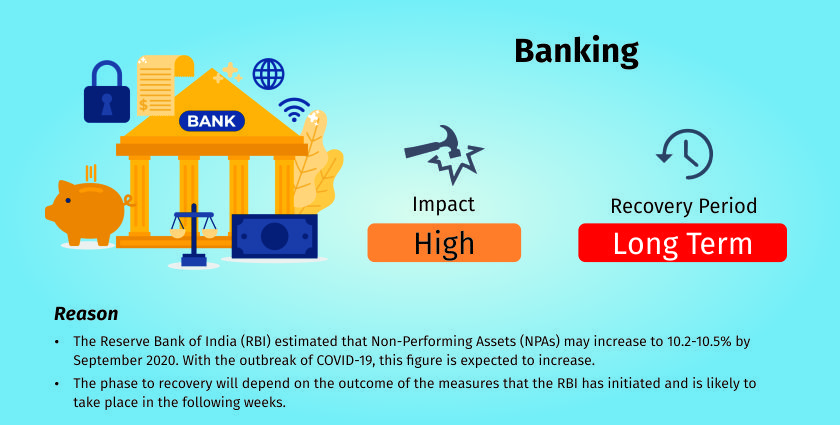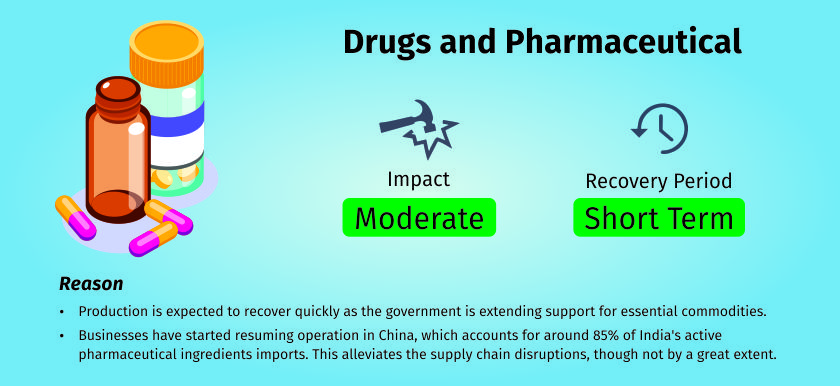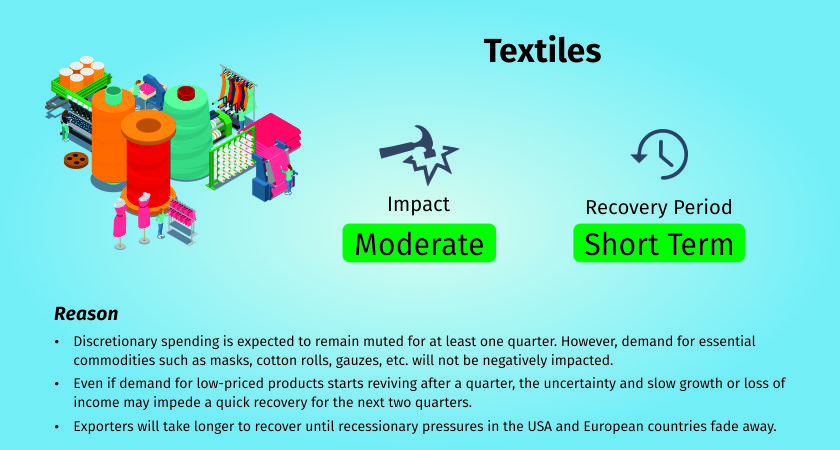The COVID-19 breakout has left the entire world shaken and stirred. Due to the lockdown several businesses and industries have taken a hit in terms of revenue and employment. Despite several measures undertaken by the government to improve the MSMEs’ condition, there seems no respite due to this unprecedented contingency. Even before the onset of this pandemic, the global economy was confronting turbulence on account of disruptions in trade and diminished growth. The situation has now been aggravated by the demand, supply and liquidity shocks that COVID-19 has imposed. Once the pandemic is controlled, the shape and speed of the recovery in the US and China will be key factors, determining the nature and traction of global economic recovery.
It is expected that the course of economic recovery in India will be smoother and faster than many other countries. While securing the population of the country has played a major role in these times and several safety measures have been taken by the government by complete lockdowns and restricted movement in the country. We also need to think about sustaining businesses and the livelihood of people. Apart from providing robust safety nets for the vulnerable, ensuring job continuity and job creation is key. Here’s how each sector has been impacted by the noble COVID-19!
COVID-19 impact on automobile
Vehicle sales in India fell to almost half in March from a year earlier, as the nationwide lockdown imposed to check the spread of the coronavirus pandemic brought production as well as dispatches to a standstill. Manufactures dispatched just over a million vehicles to dealerships last month, a 45% decline from a year earlier. According to data released by industry body Society of India Automobile Manufacturers (SIAM), passenger vehicle sales declined 51% to 143,014 units last month. While sales of commercial vehicles crashed 88% to 13,027 units, those of two-wheelers fell 40% to 866,849 units.

COVID-19 impact on financial institutions
The Government of India and RBI has introduced various economic and fiscal stimulus measures to tide over the COVID-19 crisis. To navigate through these unprecedented times the BFSI needs to focus on liquidity, credit risk, well-being of its employees along with the quality of financial reporting and disclosures. Banks profitability would be under pressure due to the following factors:
- Reduced offtake of loans under recessionary market conditions and cautious customer outlook
- Increased delinquencies post the moratorium period
- Fall in transaction banking income due to lower cross border trade

COVID-19 Impact on the pharmaceutical industry
The demand and supply of pharmaceutical products in India has increased rapidly, given the medical emergency. Though India is one of the top formulation drug exporters in the world, the domestic pharma industry relies heavily on import of bulk drugs. As per reports, India imported around Rs 24,900 crore worth of bulk drugs in FY19, accounting for approximately 40 per cent of the overall domestic consumption. With India’s API (Active pharmaceutical ingredient), imports from China averaging almost 70 per cent of its consumption by value, importers are at the risk of supply disruptions and unexpected price fluctuations. For many critical antibiotics and antipyretics, dependency on imports from China is close to 100 per cent. Due to continuous lockdowns, distributers are also facing transportation issues for supplying medicines in other states. Government exempted private laboratories from the lockdown to ensure that movement of lab technicians and transportation of samples, along with opening of temporary collection centres, should not face any hurdles.

COVID-19 impact on electronics
China is a major supplier both for the final product as well as the raw material used in electronics industry. India’s electronics industry is fearing supply disruptions, production reduction, impact on product prices due to heavy dependence on electronics component supply-directly and indirectly-and local manufacturing. The spread of coronavirus could have pushed down the sales of top electronic companies and smart phone makers which have major supplies to India. 2020 could see India falling back to the 9 per cent level as an unstable economy would hurt demand gravely.

COVID-19 impact on tourism
The aviation sector has also been impacted by the spread of coronavirus. The outbreak has forced domestic carriers to cancel and temporarily suspend flights operating from India. Coming off a high-performance base in 2019, the COVID-19 outbreak and the containment measures introduced by the Centre have resulted in a severe drop in foreign and domestic travel, across both the tourism and business traveller segments. A recent by JLL India estimates that at least 30 per cent of hotel and hospitality industry revenue could be impacted if the situation doesn’t improve by the end of June 2020. With more than 60 per cent of organised hotels in India already shut and several others operational with single-digit occupancies, recovery will be gradual.

COVID-19 impact on textile
Indian Textiles and Apparels (T&A) industry, accounts for approximately 4% of the global T&A market. The T&A industry is one of the largest and the most important sectors for the Indian economy in terms of output, foreign exchange earnings and employment. The industry contributes approximately 7% to industrial output in value terms, 2% to the GDP and 15% to the country’s export earnings. Due to countrywide lockdown, however, the industry is grappling with major hurdles in; labour force and employment, import and export of raw materials and finished garments, cash flow, supply chain. If nationwide lockdown continues and the situation persists, it will impact consumer sentiment on the higher side, due to closure of the market and mall also to maintaining social distancing, safety and health. The extent of the outbreak and lockdown would impact the length of the recovery cycle. However, to minimize the impact the Confederation of Indian Textile Industry (CITI) has requested the government to immediately announce a relief package for the textile and apparel sector to mitigate the crisis being faced by the capital and labour-intensive textile Industry, post the coronavirus spread.

COVID-19 impact on logistics
Even before the imposition of the lockdowns and the spread of COVID-19 across the world, the severe disruptions in China were having a ripple effect on global trade flows. Most companies across the globe had been working to make their supply chains leaner. Citing operational constraints, country’s largest ecommerce marketplaces suspended their logistics services for sellers on respective platforms. Also, according to the Retailers Association of India (RAI), the supply chain of about 25,000-30,000 supermarkets have so far been impacted due to the lockdown announced. The complete lockdown of other businesses and supporting services, has also aggravated the situation. Due to complete shutdown of public transport facilities, workers required for handling and transportation of essential commodities and supplies, now need to commute to their workplace on foot. For those living in the margins in the informal sector, the same is very exhausting, leading to lower productivity.

COVID-19 impact on retail
Clothing, dining out and grocery retail industry will take about a year to recover, said top industry associations - Retailers Association of India (RAI), National Restaurant Association of India (NRAI) and The Clothing Manufacturers Association of India (CMAI). In a webinar, organised by Trust for Retailers & Retail Associates of India (TRRAIN), the three associations jointly anticipated a 25-30% impact on business with multiplier effect on subsidiary industries and lasting job losses. A survival plan is the need of the hour, they said. Selling piled-up inventory as soon as malls and stores reopen followed by increasing the number of units produced per machine at the factories would be key to recovery for apparel manufacturers in post COVID era. Apparel manufacturing industry has 12 million employees with 7 million in the domestic sector while retail as an industry has 46 million employees out of which 6 million are in modern retail. Currently, retailers selling discretionary products from apparel to lifestyle are neither allowed to open stores nor sell online.

COVID-19 impact on hospitality
India’s hotel and hospitality industry’s occupancy has declined sharply in the first quarter of 2020, as the COVID-19 outbreak impacts various segments of the sector, according to a report by JLL India. “In the third week of March 2020, at an, all India level, the hotels’ sector witnessed a decline of more than 65 per cent in occupancy levels as compared to the same period of the previous year. As travel restrictions around the world intensified further, second and third quarters of 2020 are likely to be similarly impacted,” according to the report. The report estimates that at least 30 per cent of hotel and hospitality industry revenue could be impacted if the situation doesn’t improve by the end of June 2020. With more than 60 per cent of organised hotels in India already shut and several others operational with single-digit occupancies, recovery will be gradual.

COVID-19 impact on events and entertainment
Of the 60 million staff, 10 million have been directly impacted, and their livelihood is at risk as all major national events are postponed or cancelled due to the COVID-19 pandemic. The pandemic has led to cancellations of conferences, both public and private, national/international meetings, incentives, conferencing, exhibitions (MICE) events, choking the lifeline of the industry. The industry is unable to pay the staff salaries, taxes, banks. Besides the 10 million it employs directly, the events and entertainment industry indirectly provides jobs to another 50 million through allied sectors like food and beverages, hospitality, tourism, advertising and marketing industry.

Data Sources: Ministry of Commerce & Industry, Ministry of MSMEs, D&B Survey
Mr. Praveen Khandelwal, Secretary General Confederation of All India Traders (CAIT) shares his thoughts on the ongoing situation and what safety measures are businesses taking to mitigate the risks caused by the pandemic.

















